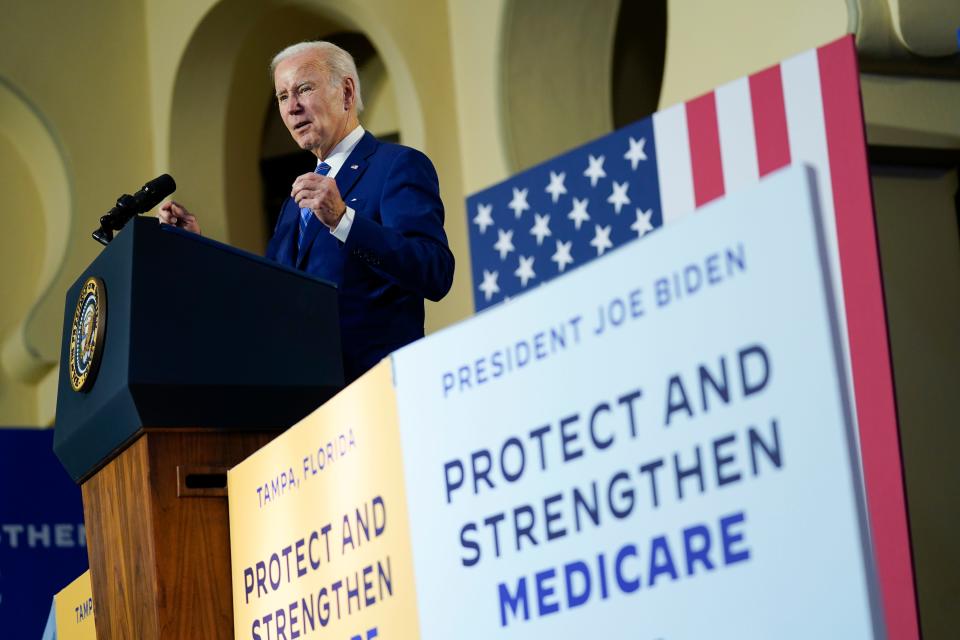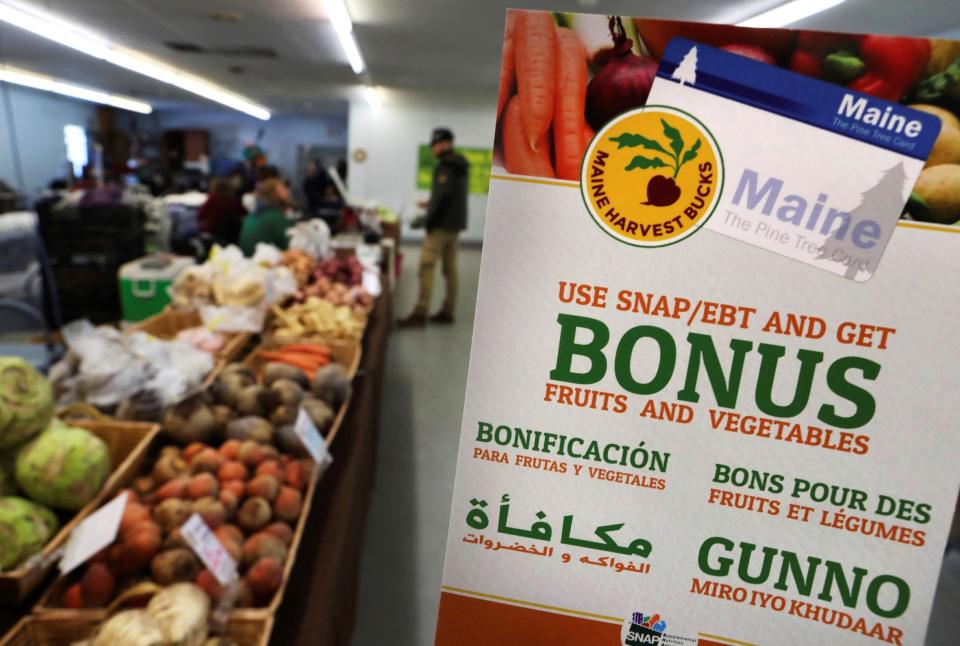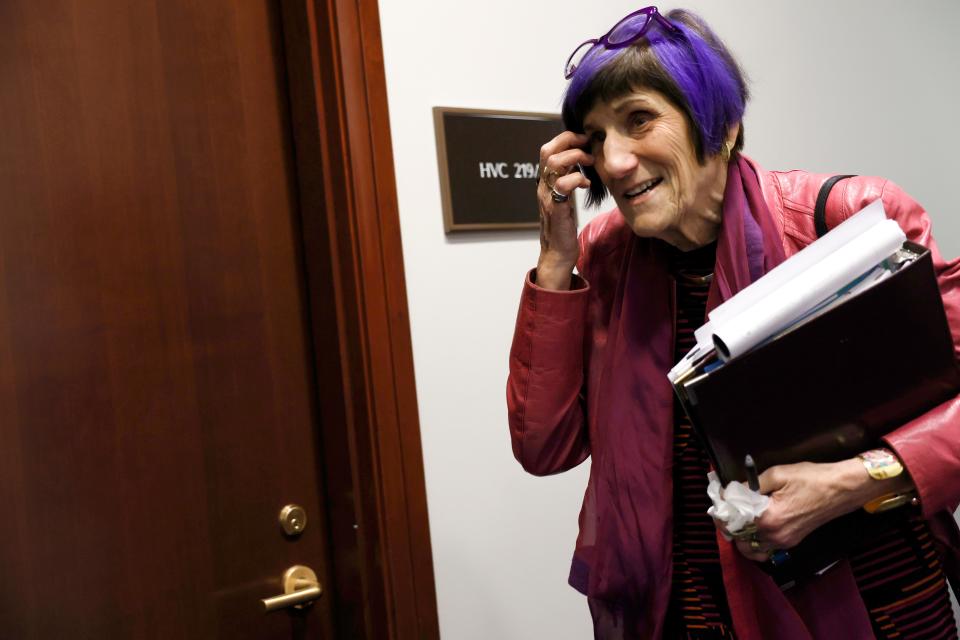No default, but not everyone emerged a winner from debt ceiling deal
- Oops!Something went wrong.Please try again later.
WASHINGTON − The bipartisan deal President Joe Biden and House Speaker Kevin McCarthy negotiated to end the debt ceiling standoff had a clear winner. Americans no longer have to worry the U.S. will default on its debt in coming days, an unprecedented event that would have damaged the global economy, diminished U.S. standing in the world and reduced household wealth.
But the deal Congress passed Thursday night didn’t please everyone.
Here’s a look at who came out the best, and the worst, from the months-long saga.
Winners
House Speaker Kevin McCarthy
McCarthy is perhaps the biggest political winner out of the debt-ceiling fight, overcoming discontent from the right flank of his party and squeezing spending concessions out of the White House after Biden initially refused to negotiate over the debt ceiling.
McCarthy proved he can unite most of the Republican conference even with members of the House Freedom Caucus threatening to oust him from his speakership.
Their outcries about McCarthy’s debt-ceiling deal with Biden ended up being noise with little thump. All but a handful of the roughly 40 Freedom Caucus members voted against the debt ceiling deal, producing about half of the Republican no votes. Most Republicans, 149, voted for the bill.
Still, despite his big moment, unrest among hardline conservatives remains and the fight over his speakership might not be over. Even though the deal passed, some Freedom Caucus members said McCarthy's deal-making with Biden could be grounds for a motion to vacate his speakership based on Republican rules he accepted to secure his speakership.
More: Who voted against the debt ceiling bill in the House? These 117 lawmakers opposed it

President Joe Biden
Can the leaders of both parties really be winners in the same standoff?
In this unique case, yes.
Biden didn’t get the “clean” debt limit bill he’d asked for, but he avoided a default without having to accept Republicans’ biggest demands, including major changes to the climate provisions in last year’s Inflation Reduction Act.
The administration also mitigated the impact in other areas, particularly offsetting an expansion of work requirements for food stamp recipients with an exemption for some vulnerable groups that, overall, slightly increase food stamp assistance.
The agreement burnishes Biden’s credentials as a bipartisan deal maker while preventing a huge hit to the economy that could have jeopardized his re-election bid.
But the rating agency Fitch said Friday it's maintaining its warning of a potential credit downgrade because "repeated political standoffs around the debt-limit...lowers confidence in governance on fiscal and debt matters."
Related: Biden scores win with debt ceiling deal; progressive revolt or shutdown can't be ruled out
Social Security and Medicare recipients
The deal doesn’t touch Social Security or Medicare, despite the fact that they’re among the biggest categories of spending and a major driver of the projected growth in the federal debt.
Biden, early on, challenged Republicans to stay away from those popular programs – and they did.
On Medicaid, the health care program for lower-income Americans, Republicans wanted to impose work requirements for some recipients. But that was not include in the final deal.

Veterans
After the GOP-controlled House passed its package of spending cuts in April, one of the administration’s main attacks was how it could hurt military veterans. The bipartisan agreement newly exempts veterans from work requirements for food stamp recipients and fully funds medical care for veterans at the level Biden had proposed for next year. That includes about $20 billion in care for veterans who have been exposed to toxic substances or environmental hazards.
High-income earners and corporations
During negotiations with McCarthy, Biden pushed for revenue increases through higher taxes on the wealthiest Americans and corporations while closing certain tax loopholes.
Democrats wants to end some of the tax cuts passed in 2017 during the Trump administration. But the debt-ceiling deal passed by Congress includes no tax changes and leaves Trump's tax cuts intact.
With the tax system untouched, Biden is likely to make his call for millionaires and corporations to "pay their fair share" in taxes a centerpiece of his reelection campaign.

Losers
Older food stamp recipients
Some able-bodied adults without dependent children will be subject to tougher work requirements if they want food assistance. Instead of ending at age 49, the requirements would gradually extend up to age 54 by 2025. After 2030, however, the maximum age would revert back to 49 unless Congress extends the provision.
Also, veterans, homeless people and young people who have aged out of foster care would be newly exempted from work rules. As a result, slightly more people overall are expected to benefit from food assistance, according to the nonpartisan Congressional Budget Office.

IRS
After Democrats boosted IRS funding last year to improve customer service and go after tax cheats, the deal takes a chunk of that new money back. The administration also agreed to repurpose $20 billion in IRS funding for other nondefense programs over the next two years.
The White House says the rescinded funds would’ve been used in later years of the 10-year budget window and the deal won’t “fundamentally change” IRS plans for the next few years.
Still, the CBO estimates the deal will reduce by $2.3 billion the amount of taxes the IRS would’ve been able to collect from better enforcement through 2033. The amount of lost revenue is estimated to be greater than the budget savings, resulting in an increase to the deficit.
Environmental advocates
Environmental advocates are furious the package fast-tracks a controversial natural gas pipeline in Appalachia at the request of Sen. Joe Manchin, D-W.Va., and speeds up the process for energy projects.
White House officials argued that the faster approval process will accelerate the transition to a “clean energy future.”
They also say they stopped Republicans from gutting many of the landmark renewable energy tax breaks included in last year’s Inflation Reduction Act. But environmentalists weren’t having it.
“Paying our bills is not a tool to hold our country hostage or capitulate to special interests intent on destroying the planet,” tweeted Ben Jealous, executive director of the Sierra Club.

Student loan borrowers
Student loan borrowers, who have been granted pauses from their monthly payments during the pandemic, would have to resume payments after August. That’s in line with what the Biden administration had previously announced. But putting the end date into law prevents the president from reversing course.
While Biden did not agree to Republicans’ demand that he rescind his program to forgive student loan debt for millions of Americans, the future of that program rests in the hands of the Supreme Court. A decision is expected this month.
Congressional appropriators
The deal limits how much Congress can spend through the 12 spending bills it must pass annually to keep the government running. But it will be up to the lawmakers who write those bills to figure out how to make the math work, a task made even harder in a divided government. And if they can’t do it, an automatic 1% spending cut kicks in.
Several Democrats on the House Appropriations Committee voted against the deal, including the top Democrat, Connecticut Rep. Rosa DeLauro, who said it “subverts the annual appropriations process.”

This article originally appeared on USA TODAY: Winners and losers in bipartisan debt ceiling deal

